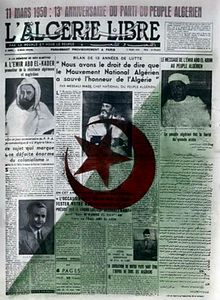Independence Day (Algeria)
This article may require cleanup to meet Wikipedia's quality standards. The specific problem is: "This article needs copyediting, as it appears a non-native speaker wrote most of it". (October 2015) |
| Independence Day of Algeria | |
|---|---|
| Observed by | Algeria |
| Type | National |
| Celebrations | Flag Hoisting, Parades, Singing Patriotic Songs and the national anthem, Speech by the President of Algeria. |
| Date | July 5 |
| Next time | July 5, 2024 |
| Frequency | Annual |
Independence Day (
Arabic: عيد الاستقلال, French: Jour de l'Indépendance), observed annually on 5 July, is a National Holiday in Algeria commemorating colonial Algerian independence from France on 5 July 1962
.
Algerian War (1954–1962)

The
anticolonialism into the national consciousness. Abusive tactics of the French Army
remains a controversial subject in France to this day.
In the early morning hours (12:00 am) of 1 November 1954, the National Liberation Army (
war of independence
. An important watershed in this war was the massacre of civilians by the FLN near the town of Philippeville in August 1955. The government claimed it killed 1,273 guerrillas in retaliation; according to the FLN, 12,000 Muslims perished in an orgy of bloodletting by the armed forces and police, as well as colon gangs. After Philippeville, all-out war began in Algeria. The FLN fought largely using guerrilla and terrorist tactics whilst the French counter-insurgency tactics often included severe reprisals and repression.
Eventually, protracted negotiations led to a cease-fire signed by France and the FLN on March 18, 1962, at
Evian accords also provided for continuing economic, financial, technical, and cultural relations, along with interim administrative arrangements until a referendum on self-determination
could be held. The Evian accords guaranteed the religious and property rights of French settlers, but the perception that they would not be respected led to the exodus of one million pieds-noirs and harkis.
Between 350.000 and 1 million Algerians are estimated to have died during the war, and more than 2 million, out of a total
Jewish descent and those Muslim Algerians who had supported a French Algeria (harkis). 30–150,000 pro-French Muslims were also killed in Algeria by FLN in post-war reprisals.[2]
French President Charles De Gaulle pronounced Algeria an independent country on 3 July.[3] The decision was published in the official journal the following day,[4] and Algerian leaders declared 5 July, the anniversary of the French arrival in Algiers, to be Independence Day.[5]
See also
References
- ^ Kimmelman, Michael (5 March 2009). "The New York Times". Retrieved 2016-09-29.
- ^ Alistair Horne, A Savage War of Peace (1977)
- ^ John Pike. "Algerian National Liberation (1954-1962)". globalsecurity.org. Retrieved 2016-09-29.
- ^ Declaration recognising Algeria’s independence (Paris, 3 July 1962) CVCE
- ^ Background Notes United States Department of State. Office of Media Services, p3
External links
Wikimedia Commons has media related to Independence Day (Algeria).
